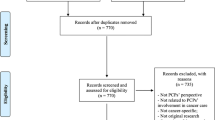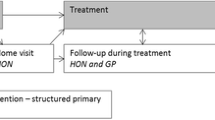ABSTRACT
BACKGROUND
The demand for oncology services in the United States (US) is increasing, whereas a shortage of oncologists looms. There is the need for a better understanding of the involvement of primary care physicians (PCPs) in cancer care.
OBJECTIVE
To characterize the role of PCPs in cancer care, compare it with that of oncologists, and identify factors explaining greater PCP involvement in cancer care.
DESIGN
National survey of physicians caring for cancer patients conducted by the Cancer Care Outcomes Research and Surveillance Consortium.
PARTICIPANTS
1694 PCPs; 1621 oncologists.
MEASUREMENTS
Questionnaires mailed during 2005 and 2006 examined the participation of physicians in 12 aspects of care for cancer patients.
MAIN RESULTS
Over 90% of PCPs fulfilled general medical care roles for patients with cancer such as managing comorbid conditions, chronic pain, or depression; establishing do-not-resuscitate status; and referring patients to hospice. Oncologists were less involved in these roles. Determining the treatment preferences of individual patients and deciding on the use of surgery were the only cancer care roles in which ≥50% of PCPs participated. Twenty-two percent of PCPs reported no direct involvement in cancer care roles while 19% reported heavy involvement. PCPs who were aged ≥50 years, were internists or geriatricians, taught medical students, saw more cancer patients, or experienced referral barriers fulfilled more roles. Rural practice location was not associated with greater PCP involvement in cancer care.
CONCLUSIONS
PCPs across the US have an active role in cancer patient management. Determining the optimal interface between PCPs and oncologists in delivering and coordinating cancer care is an important area for future research.



Similar content being viewed by others
References
Institute of Medicine. Fulfilling the Potential of Cancer Prevention and Early Detection. Washington, D.C.: National Academies Press; 2003.
American Cancer Society. Cancer Facts & Figures 2007. Atlanta: American Cancer Society; 2007.
Erickson C, Salsberg E, Forte G, Bruinooge S, Goldstein M. Future supply and demand for oncologists: challenges to assuring access to oncology services. J Oncol Pract. 2007;3:79–86.
Warren JL, Mariotto AB, Meekins A, Topor M, Brown ML. Current and future utilization of services from medical oncologists. J Clin Oncol. 2008;26:3242–7.
Bodenheimer T. Primary care: will it survive? N Engl J Med. 2006;355:861–4.
Williams PT. The role of family physicians in the management of cancer patients. J Cancer Educ. 1994;9:67–72.
Worster A, Wood ML, McWhinney IR, Bass MJ. Who provides follow-up care for patients with early breast cancer? Can Fam Physician. 1995;41:1314–20.
Worster A, Bass MJ, Wood ML. Willingness to follow breast cancer: survey of family physicians. Can Fam Physician. 1996;42:263–8.
Grunfeld E, Levine MN, Julian JA, et al. Randomized trial of long-term follow-up for early-stage breast cancer: a comparison of family physician versus specialist care. J Clin Oncol. 2006;24:848–55.
Keating NL, Landrum MB, Guadagnoli E, Winer EP, Ayanian JZ. Surveillance testing among survivors of early-stage breast cancer. J Clin Oncol. 2007;25:1074–81.
Snyder CF, Earle CC, Herbert RJ, Neville BA, Blackford AL, Frick KD. Trends in follow-up and preventive care for colorectal cancer survivors. J Gen Intern Med. 2008;23:254–9.
Norman A, Sisler J, Hack T, Harlos M. Family physicians and cancer care: palliative care patients’ perspectives. Can Fam Physician. 2001;47:2009–16.
Hickner J, Kent S, Naragan P, Hunt L. Physicians’ and patients’ views of cancer care by family physicians: a report from the American Academy of Family Physicians National Research Network. Fam Med. 2007;39:126–31.
Ayanian JZ, Chrischilles EA, Fletcher RH, et al. Understanding cancer treatment and outcome: the Cancer Care Outcomes Research and Surveillance Consortium. J Clin Oncol. 2004;22:2992–6.
National Cancer Institute. Cancer Care Outcomes Research and Surveillance Consortium. Last accessed June 22, 2009 at http://healthservices.cancer.gov/cancors/.
Keating NL, Landrum MB, Klabunde CN, et al. Adjuvant chemotherapy for stage III colon cancer: do physicians agree about the importance of patient age and comorbidity? J Clin Oncol. 2008;26:2532–7.
Little RJ, Rubin DB. Statistical Analysis with Missing Data. New York, NY: Wiley; 2002.
He Y, Zaslavsky AM. Imputation in a multiformat and multiwave survey of cancer care. Proceedings in Health Policy Statistics, American Statistical Association, 2007.
University of Washington Rural Health Research Center. Rural-Urban Commuting Area (RUCA) Codes. Last accessed June 22, 2009 at: http://depts.washington.edu/uwruca.
Institute of Medicine. From Cancer Patient to Cancer Survivor: Lost in Transition. Washington, D.C.: National Academies Press; 2006.
Ko C, Chaudhry S. The need for a multidisciplinary approach to cancer care. J Surg Res. 2002;105:53–7.
Reich M. Depression and cancer: recent data on clinical issues, research challenges and treatment approaches. Curr Opin Oncol. 2008;20:353–9.
Mao JJ, Armstrong K, Bowman MA, Xie SX, Kadakia R, Farrar JT. Symptom burden among cancer survivors: impact of age and comorbidity. J Am Board Fam Med. 2007;20:434–43.
Smith AW, Reeve BB, Bellizzi KM, Harlan LC, Klabunde CN, Amsellem M, et al. Cancer, comorbidities, and health-related quality of life of older adults. Health Care Financ Rev. 2008;29:41–56.
Lloyd-Williams M, Shiels C, Taylor F, Dennis M. Depression: an independent predictor of early death in patients with advanced cancer. J Affect Disord. 2009;113:127–32.
Passik SD, Dugan W, McDonald MV, et al. Oncologists’ recognition of depression in their patients with cancer. J Clin Oncol. 1998;16:1594–600.
Hubbard G, Kidd L, Donaghy E. Preferences for involvement in treatment decision making of patients with cancer: a review of the literature. Eur J Oncol Nurs. 2008;12:299–318.
Snyder CF, Earle CC, Herbert RJ, Neville BA, Blackford AL, Frick KD. Preventive care for colorectal cancer survivors: a 5-year longitudinal study. J Clin Oncol. 2008;26:1073–9.
Keating NL, Landrum MB, Guadagnoli E, Winer EP, Ayanian JZ. Factors related to underuse of surveillance mammography among breast cancer survivors. J Clin Oncol. 2006;24:85–94.
Keating NL, Landrum MB, Guadagnoli E, Winer EP, Ayanian JZ. Care in the months before death and hospice enrollment among older women with advanced breast cancer. J Gen Intern Med. 2007;23:11–8.
Institute of Medicine. Ensuring Quality Cancer Care. Washington, D.C.: National Academies Press; 1999.
Schrag D. Communication and coordination: the key to quality. J Clin Oncol. 2005;23:6452–5.
Ayanian JZ, Zaslavsky AM, Guadagnoli E, et al. Patients’ perceptions of quality of care for colorectal cancer by race, ethnicity, and language. J Clin Oncol. 2005;23:6576–86.
Bodenheimer T. Coordinating care: a perilous journey through the health care system. N Engl J Med. 2008;358:1064–71.
Bowles EJA, Tuzzio L, Wiese CJ, et al. Understanding high-quality cancer care. Cancer. 2008;112:934–42.
Hart LG, Skillman SM, Fordyce M, Thompson M, Hagopian A, Konrad TR. International medical graduate physicians in the United States: changes since 1981. Health Aff. 2007;26:1159–69.
Onega T, Duell EJ, Shi X, Wang D, Demidenko E, Goodman D. Geographic access to cancer care in the U.S. Cancer. 2008;112:909–18.
Acknowledgements
This study was supported by grants from the National Cancer Institute to the CanCORS Statistical Coordinating Center and Primary Data Collection and Research Centers: U01 CA093344, U01 CA093332, U01 CA093324, U01 CA093348, U01 CA093329, U01 CA01013, U01 CA093326, and by a grant from the Department of Veteran’s Affairs to the Durham VA Medical Center, U01 CDA093344 (MOU) and HARO 03-438MO-03.
Conflict of Interest
None disclosed.
Author information
Authors and Affiliations
Corresponding author
Rights and permissions
About this article
Cite this article
Klabunde, C.N., Ambs, A., Keating, N.L. et al. The Role of Primary Care Physicians in Cancer Care. J GEN INTERN MED 24, 1029–1036 (2009). https://doi.org/10.1007/s11606-009-1058-x
Received:
Revised:
Accepted:
Published:
Issue Date:
DOI: https://doi.org/10.1007/s11606-009-1058-x




